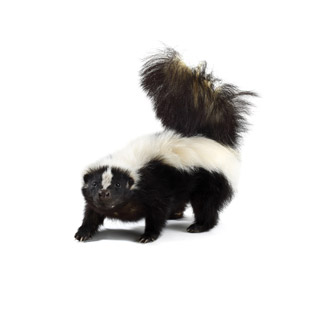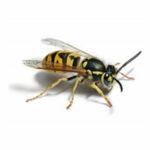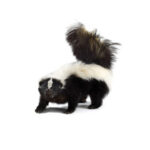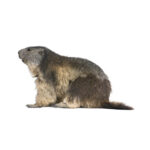
Skunks Infestation
Skunks are mammals in the family Mephitidae. They are famous for their ability to spray a liquid with a very strong and unpleasant scent from their anal glands. There are different species of skunk that vary in appearance from black-and-white to brown, cream or ginger, but all have that warning coloration to keep predators away. The usual skunks are easily identifiable by their characteristic black and white striping, they will produce a foul odor from their gland when frightened. Skunks will use their powerful defense as last resort, and only when they or their young are threatened and cannot escape. Even then, skunks will give ample warning before resulting to the spaying. Skunks are usually nocturnal mammals and non-aggressive to human, unless provoked or attacked.

Infestation Origin:
It is common for skunks to be attracted to low-hanging fruit, garbage and pet food left out over night. Skunks are mostly active at night time, they sometimes look for food during the day. You might see them during the day in the spring, when they have young and may be hungry. In the city, skunks have adapted to living near humans and they raid gardens, trash cans, outdoor pet food, and compost. Skunks will eat almost anything they get their hands on. Detecting skunks on your property is rather easier than detecting many other wildlife pests, we often smell a skunk before we even see it. Seeing a skunk or several skunks on your property is an obvious sign of skunks infestation.

Infestation Preventive Care:
To prevent skunks and other rodents infestations; Reduce food sources, keep all trash cans lids secure, remove all bird feeders and don’t leave pet food out overnight, secure holes and gaps under decks and porches. If You see a skunk is behaving irregularly or erratically, as skunks are carriers of the rabies virus, and the bacterial disease called leptospirosis. Contact your local exterminator to get rid of the infestation. You can also get rid of them by using a safe and humane skunk repellent.





